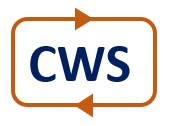 |
Collaborative Work Systems Inc.Engineering Human Centered Collaborative Systems for Complex Work Environments |
 |
Collaborative Work Systems Inc.Engineering Human Centered Collaborative Systems for Complex Work Environments |
 |
Collaborative Work Systems Inc.Engineering Human Centered Collaborative Systems for Complex Work Environments |
Networked socio-technical work systems are often a complex community of people, technologies, information, and services interconnected by a communications network, seeking to achieve optimal utilization of resources, synchronization of events, and specific outcomes. For these organizations to be effective users of the network need to be aware of relevant information that can aid their decision making, and they need to have it at the right time and in optimal formats to ensure efficient and effective decisions.
Necessary collaboration among people and technologies means that the "pushing" and "pulling" of information can come from either source, and good team processes are needed to share, interpret, plan, and act on information in the network to achieve goals. Even when these systems are well designed, some training is normally required to help individuals and teams achieve optimal performance.
Organizational knowledge management is also critical because much of an organizations knowledge is tacit. This is particularly true when organizations are distributed and for meta knowledge. For these organizations it is critical that there is good self-awareness within an organization and of other organizations and groups that are both collaborators and competitors. Challenges in this regard include relevant data collection, aggregation and transformation, and analysis and presentation of results necessary to make it meaningful and part of an organization's decision making processes.
Some of the most important concepts in socio-technical work system operations are:
Supporting Awareness
Data generation
Data collection & distribution
Data availability & security
Awareness of what is where
Data accuracy
Data sharing
Data transportation speed & reliability
Data representation
Interoperability between systems
Data location
Supporting Understanding
Information visualization
The representation effect
Data aggregation
Data transformation
Interpretation
Pattern detection
Knowledge & skills
Critical thinking
Collaborative sense making
Consensus building
Diagnosis
Supporting Action
Communicating intent
Control
Decision making
Planning
Contingency planning
Goals
Motivation
Reminders
Synchronization
Resource allocation
Negotiation
Supporting Learning
Perceptual learning
Adaptive training
Performance feedback
Student modeling
Student profile
Scenario based training
Coaching
Case based learning
Collaborative learning
Team training
After action reviews
< R & D Multimodal Communications >